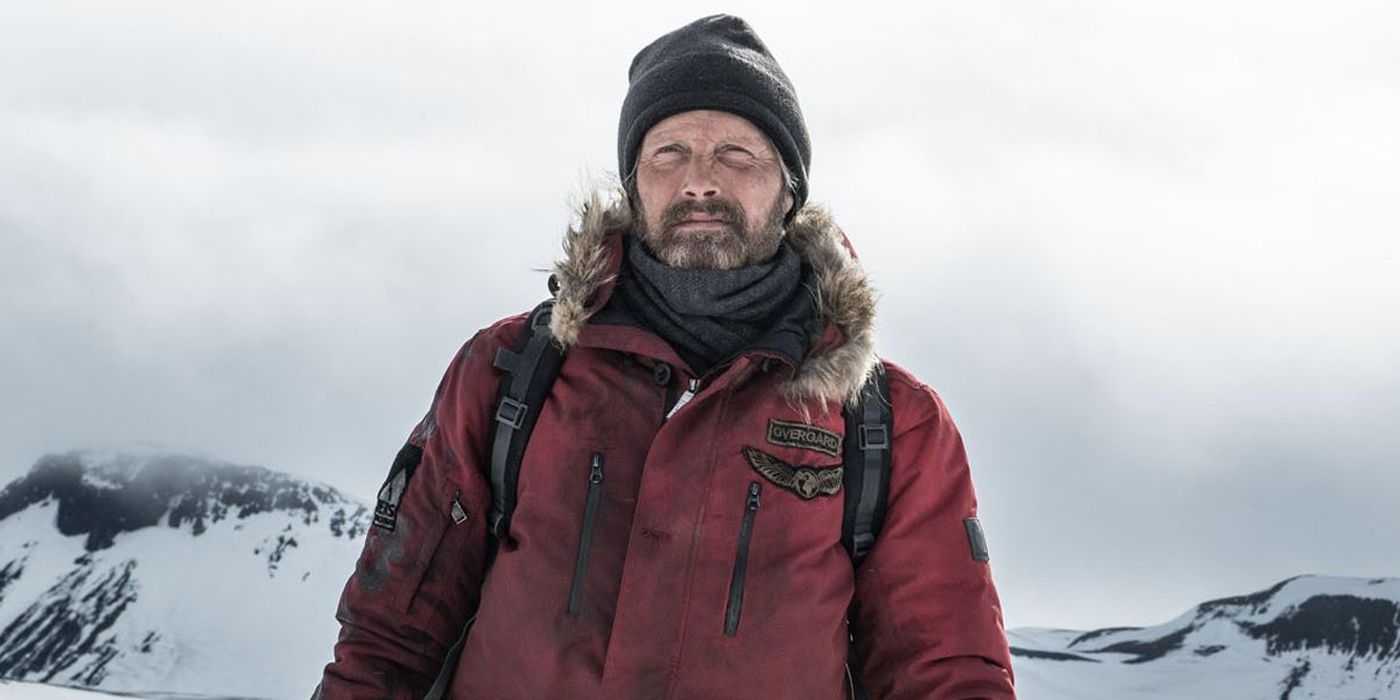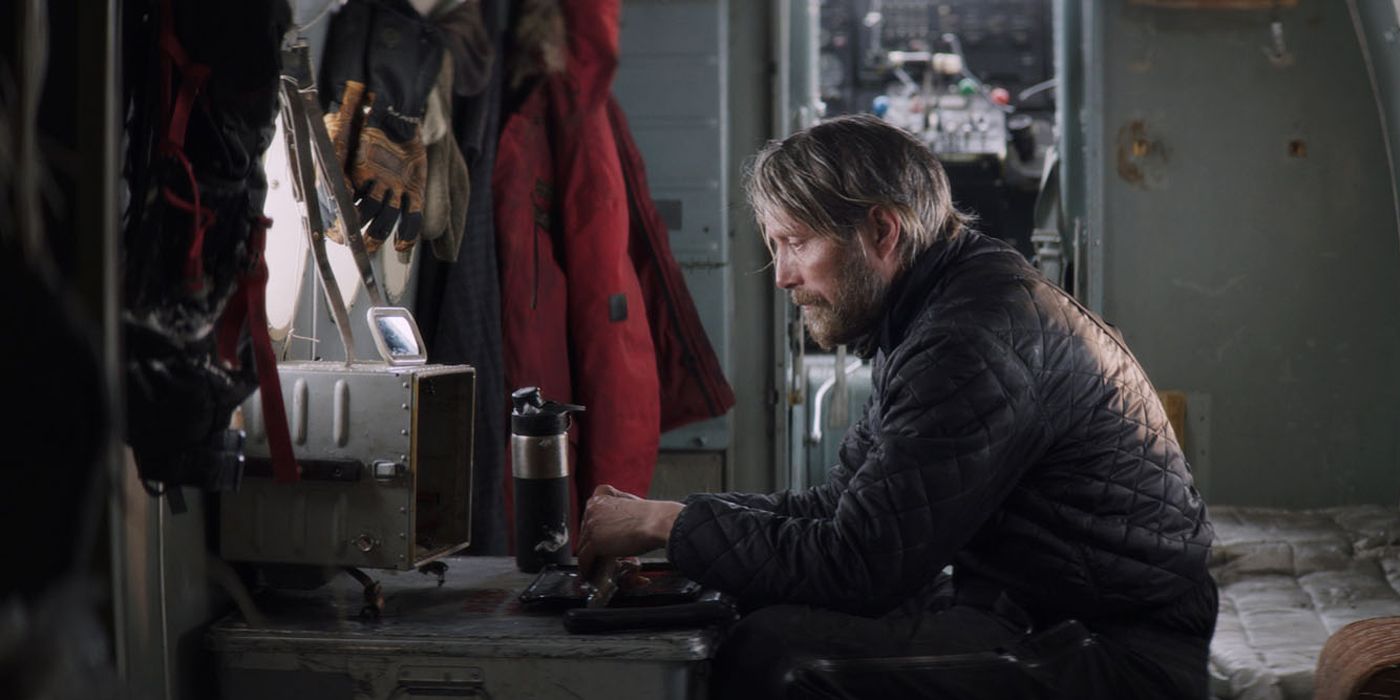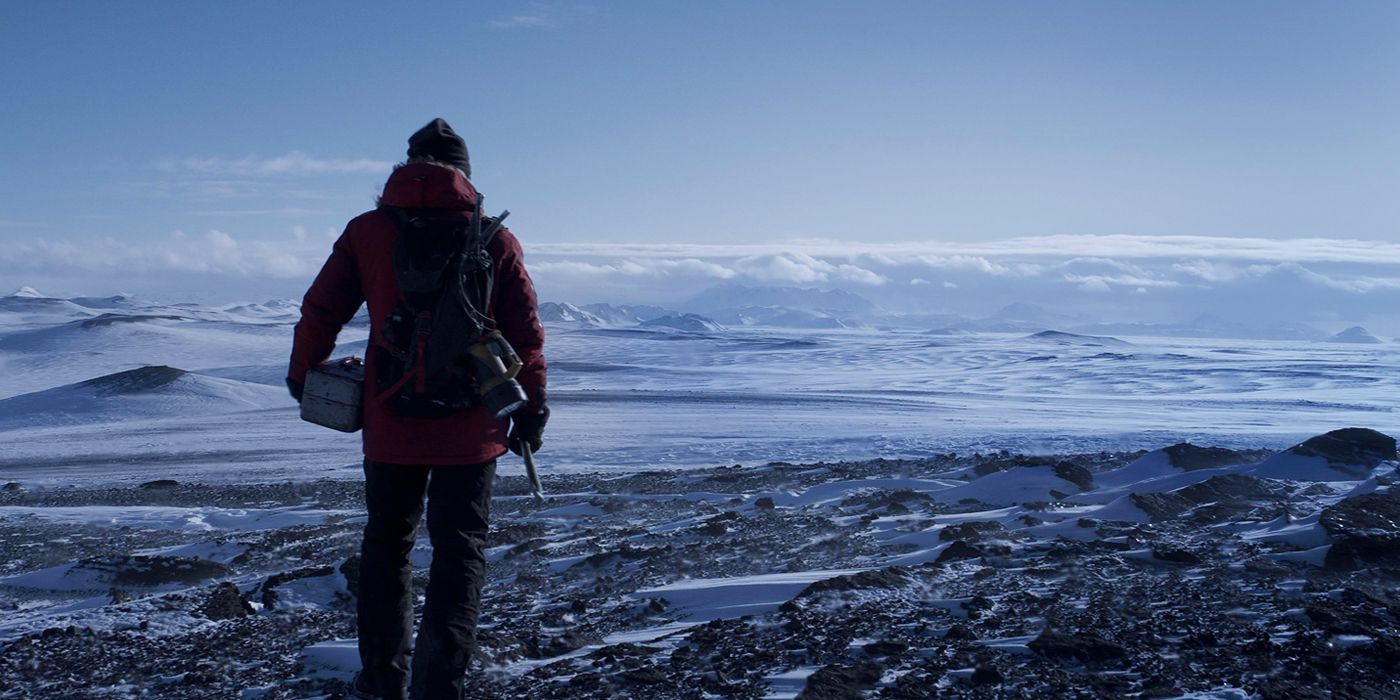WARNING: Minor SPOILERS for Arctic
-
In Joe Penna's feature-length directorial debut Arctic, Mads Mikkelsen is the lone survivor of a plane crash whose will to survive is as powerful as his inherent need to protect. The director and actor took great pains to elevate Arctic beyond any familiar survival film mechanics with which audiences are no doubt more than familiar - and the payoff more than satisfies.
Mikkelsen stars as a man struggling to survive after his plane crashes in the Arctic. An engineer identified only by the patch on his jacket - Overgård - he's forced into a meticulous daily routine, with little to no chance of being rescued. However, when he realizes that he has no choice but to break with his routine in order to seek out rescue himself, he thrusts himself into an impossible journey that comes with no guarantee of survival. Screen Rant spoke with Penna and Mikkelsen about the struggles associated with filming Arctic on location, what it meant to tell a story about impossible odds, and how Ridley Scott's The Martian forced Penna to transform his original concept into an entirely new idea.
Related: Arctic Trailer & Poster: Mads Mikkelsen Fights For Survival
Arctic doesn't look like the easiest movie to make. Why was it so important that you made it? And why was it so important to star in it - considering how difficult it was?
Mads Mikkelsen: Making it is a funny story. I think we should start with that. The original idea.
Joe Penna: Yeah, the original idea was this image that I saw on the internet that was a half-terraformed Mars, and I brought it to my co-writer, and I said, "This is interesting. Let's tell a story in this world." And he was like, "OK, what kind of story?" And I wanted to tell a story that was universal, that everybody could understand; that my grandmother in Brazil, who doesn't speak any English, can watch it and enjoy it just as much as somebody from Denmark. So, we started talking about that could be. We considered a colony, but really a survival story is what we were trying to do. That's something that everybody could understand. So, we write the script, we send it to my agents, and they said, "This is a wonderful script, but you should really check out the trailer for this new film that's coming out soon called The Martian. It's likely going to step on what you guys are trying to do here. So, we changed it to the Arctic, and then sent it to Mads and... [to Mads] What did you think?
Mads Mikkelsen: Yeah, well, I loved it, obviously. And I thought there was an honesty in the story that is kind of rare when you go through scripts these days. There's this trap of falling into the flashbacks and down memory lane, and it never happens. Every time I turn the page, I was like, "Oh, I'm so relieved it didn't happen." You know? Be honest; be honest with your story. And it became very poetic and quite dramatic for me to read because of that.
There is a lot of restraint in the movie - in terms of the backstory, in terms of the pace. I really appreciated that. Was there a reason why you wanted to go after that specific tone when you were writing it?
Joe Penna: Yeah, you know, I had seen films like Robert Bresson's A Man Escaped, and I loved the fact that not much needs to be said in order to get you to understand a character. In fact, Hitchcock has said many times that it's the opposite. The more that you impart into a character, the more that there are parts of the audience that are not going to be able to understand or to relate to that, so I wanted to create a rubric of a man - just the silhouette - and, really, all of the characterization comes from the other person who's there. We get her picture, we get her story, more than we get his story.
Mads Mikkelsen: But her story and her her picture is vital for him. So, we can obviously guess that he has something to live for himself. Yeah. Not much to add. I think that was- obviously, we're not going to give anything away, but there's a second person in the film eventually. So, we're dealing with a comfortable numb in the beginning of the film; a man who's surviving, basically; he's got patterns, he's got rhythms, he's got systems. In order to stand sane, he does kind of insane things - talking to himself. But there's a pattern to it. He could probably be there sitting there, waiting twenty years, maybe sixty years - depending on how much he can take - but nothing is happening. When she enters the film, he becomes alive again. He starts living. And one of the little moments I enjoyed most in the film was when, after he saved her and brought her to safety in his plane, he steals a huck from her - because he hasn't been close to another human for months and months. So, he steals that huck. And that kind of humanity that was in the script was very powerful.
Were there any real-life people or any real-life stories that you guys went to for inspiration? Or not necessarily...
Joe Penna: Not really.
Mads Mikkelsen: No. As Joe said, we're hoping it's you and me who's on that screen; that it's anyone. So, in many ways, even though he's fairly skillful - he's an engineer - he might be a little more skillful with technology than me, but besides that, there's not a lot of stuff he's doing that I wouldn't have done myself. It's within range. And the audience isn't screaming, "No, that's dumb. Do something else." But it's still within range of the audience doing something quite similar. And that's what we wanted it to be; not something extravagant, about this extreme person. He's just a person.
Related: Mads Mikkelsen Used to be a 'Huge Graphic Novel Collector'
I think that was one of the biggest strengths of the movie. It does feel so- like you said, he may be an engineer, but he's so relatable, and that's what drew me to it.
Joe Penna: He's not necessarily MacGyver. He can't make a radio out of fish guts.
Mads Mikkelsen: Ice, maybe. An ice radio. [laughs]
That's the spinoff.
Joe Penna: Arctic MacGyver. That's the next one.
What was it like shooting on location?
Joe Penna: For me? Not so good.
I can imagine. Lot of wide shots. You guys didn't look like you had a lot of places to run off to.
Mads Mikkelsen: We didn't have any places. We didn't have any hiding places.
Joe Penna: Footprints were a massive issue. We had to constantly move farther and farther away from set throughout the day in order to move to fresh snow. And the wind really got to you, even though I was wearing goggles. It was hard even for Mads, and he's Scandinavian.
How did you- Now, obviously your character has to go through a lot of challenges and obstacles. [To Joe] How did you decide on the process of how you were going to elevate, while still keeping things grounded? Like you said, keeping it in that realm of reality.
Joe Penna: There were a lot of things that we needed to figure out that were the movie version of real life. Like, how- We have fifteen minutes of footage of Mads eating a fish. How do we cut that down into feeling like it's fifteen minutes, but it only plays in a few minutes? It's the "movie-slow" version of it, is what my editor kept saying. What's the "movie-polar bear attack?" What's the movie-this, the movie-that, the movie-fall through the ice? What are those things that we can hint at what happened in real life or a real version of this, but still have it be something that's watching in 90-something minutes?
One of the scariest scenes is when you step into the footprint. You kind of get set up, and you have no idea what's going to happen. There's so much mystery in this whole movie, and then you see this - and it works. It's satisfying on such a grounded level, but such an intense level, too.
Mads Mikkelsen: Every little change in his universe is an enormous change. Nothing diverts from his every day life. It's just like, this is what he does, this is what he does... Any little change is either a miracle or a disaster. And it felt like that for us, as well, because it was Groundhog Day for us [laughs]. Sometimes, I was all bloodied up, and, "Yeah, you know what, I might just sleep in my parka coat tonight," and in two hours, we're up again. So, that's how we filmed.
And it's pretty much just you, but you do have a co-star. What is the challenge in acting alongside someone who's mostly unresponsive? But also, what is the challenge in just being alone?
Mads Mikkelsen: So, compared to being alone, then working with her, was just a miracle. I might as well have had a lot of dialogue with her. Just her being present made it- everything's human, even without the dialogue. But being by yourself, well that was just sticking to the plan. So, this man comes out, and he looks at his fishing rods, and one of the hooks is gone, and he has no fish. And, if we get a little bored, we might go, "Damn, I lost that fish." But no way in Hell do we do that. This is happening every day to him, so there's barely any reaction. This is what happens. It's there... moving onto the next one.
Related: Polar Ending Explained: What Happens In The Netflix Movie (& What It Means)
Pure stoicism.
Mads Mikkelsen: Stay firm with the script, and don't jump into the entertainment box. But, hopefully we're still entertaining. We're sort of crossing our fingers.
Joe Penna: I love that moment, in the very beginning of the film when you're holding the fish for a few moments, and you're looking at its eyes, and it's the only thing that's alive. There's no plants around. There's nothing else that's alive.
Mads Mikkelsen: There's no birds. There's nothing.
Joe Penna: It's only this fish, and he's almost sorry that he needs to kill it. He'd rather be its friend. He'd put it up in an aquarium if he could.
Mads Mikkelsen: The same with the polar bear. I mean, when you see it, of course it scares him, because it's so close. But when he sees it from a distance... To be honest, I mean, I don't know how I would react because I know it's a fast thing - much faster than me - and if it wants to, it could come for me. But at the same time, there's this mutual respect for each other's existence. As much as he would love it not to be there, he's also really pleased with it being there.
You're kind of in his terrain, and you're invading his space.
Mads Mikkelsen: Absolutely. But there's somebody breathing up there.
When you went into making this, was it more about seeing a character struggle and persevere, even if it ended badly for him? Was that the story you wanted to tell? Or was it more that you wanted some sense of relief?
Joe Penna: It was even attempted.
Mads Mikkelsen: We don't know, actually.
Joe Penna: Does it end well for him? In a way, for me, it almost doesn't matter what the end is, because it matters that he tried, and it matters that he did everything he could, and gave every ounce of his being for this other person who happens to not be the same gender, the same race; he doesn't even know her name. There's this moment in film that I wish we could have subtitled, when he's writing his name, and then he writes her name - he copies it from her driver's license - but he's writing down "driver's license" in Thai. He doesn't even get her name right.
Mads Mikkelsen: It's sweet and it's poetic. I think that there's a manuscript he goes over again and again in order to comfort her, which is like, "It's OK. You're not alone." Obviously, he's talking to himself. So, as Joe said, it doesn't matter. He can actually lay down now with her and breathe out because he's not alone. The story's obviously about finding your humanity, and that's very difficult to find when you're alone. You find it through other people.
More: Mads Mikkelsen & Jonas Åkerlund Interview: Polar
Arctic opens in theaters on February 1, 2019.




